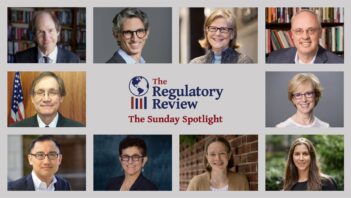
RegBlog celebrates the end of 2013 by featuring our top news posts from the past year.
As the new year arrives, The Regulatory Review would like to reflect on the many important regulatory developments that occurred in the United States and around the world during 2013. We also want to recognize some of the excellent work we had the privilege to feature on The Regulatory Review this past year. Over three days this week, we will present the top 50 The Regulatory Review essays of the past twelve months, based on the number of page views for the work appearing in each of our opinion, news, and analysis sections.
Today we feature, in alphabetical order by author, the top News stories from 2013.
![]() SEC Guidance on Social Media and Business Disclosures Stirs Controversy
SEC Guidance on Social Media and Business Disclosures Stirs Controversy
Margot Campbell | April 17
Could social media sites such as Facebook or Twitter soon become a tool for tracking investment news? Possibly, according to the Security and Exchange Commission (SEC), which announced last week that corporations may use social media sites to make business announcements without violating disclosure rules.
Cary Coglianese (University of Pennsylvania) & James Hobbs | November 11
When the Penn Program on Regulation (PPR) first established a blog on regulation nearly four years ago, it was a rather conventional blog. But PPR sought to use its project to pursue some rather unconventional aspirations: making accessible and interesting one of the most vital but least visible facets of law and policymaking—regulation.
 FTC Staff Report Outlines Best Practices for Mobile App Industry
FTC Staff Report Outlines Best Practices for Mobile App Industry
Lauren-Kelly Devine | March 7
In a mobile industry growing at what former Federal Trade Commission (FTC) Chair Jon Leibowitz described as “breathtaking speed,” the FTC staff issued a new report setting forth guidelines to ensure that consumer privacy protection keeps pace with technological innovation.
 Start-up Companies Await SEC Guidance on Equity Crowdfunding
Start-up Companies Await SEC Guidance on Equity Crowdfunding
Lauren-Kelly Devine | March 19
Last year, entrepreneurs across the country cheered the announcement of the CROWDFUND Act, a federal statute that will enable start-up businesses to raise funds from investors through specialized Internet portals. However, the Securities and Exchange Commission (SEC) is behind schedule in creating the regulatory framework to implement the statute, leaving unanswered several questions about the legal status of crowdfunding.
 Penn Convenes Major Dialogue on Chinese Administrative Law
Penn Convenes Major Dialogue on Chinese Administrative Law
James Hobbs | January 29
Chinese and American scholars recently met at the University of Pennsylvania Law School to discuss the current state of administrative law in China, and how agency decision making can be made more effective, transparent, responsive, and participatory.
 New York City Unleashes a Flood of Open Data
New York City Unleashes a Flood of Open Data
James Hobbs | April 30
Governing the country’s largest city requires massive amounts of information. Now, New York City is trying to make big data from the Big Apple open and accessible online.
 CMS Proposes to Significantly Increase Reward for Reporting Medicare Fraud
CMS Proposes to Significantly Increase Reward for Reporting Medicare Fraud
Bianca Nunes | June 18
The Centers for Medicare and Medicaid Services (CMS) recently proposed a rule that would substantially increase the potential reward for individuals who report Medicare fraud. The current Medicare Incentive Reward Program (IRP) provides a maximum reward of $1,000 per identified case.
 When It Comes to Regulation, Europe is the New United States
When It Comes to Regulation, Europe is the New United States
Ted Oxholm | January 1
The United States and Europe have swapped regulatory philosophies, according to David Vogel, professor of business and political science at the University of California, Berkeley, who spoke at the University of Pennsylvania recently as part of the Penn Program on Regulation’s risk regulation seminar series.
 Senators Question President’s Pick for OIRA Administrator
Senators Question President’s Pick for OIRA Administrator
Brady Sullivan | June 14
Senator Rob Portman may have put it best Wednesday when he described the Office of Information and Regulatory Affairs (OIRA) Administrator as “the most important job in Washington that nobody has ever heard of.”
 FCC Considers Regulating Interstate Inmate Calling Service
FCC Considers Regulating Interstate Inmate Calling Service
Wistar Wilson | January 31
While regular phone communication between prisoners and family members can ease “reintegration of inmates into society upon release from prison,” the current costs of interstate phone calls from prison can be so costly that they are prohibitively expensive for inmates and their families.
 Are Colleges Exploiting Their Tax-Exempt Status?
Are Colleges Exploiting Their Tax-Exempt Status?
Wistar Wilson | May 14
The Internal Revenue Service (IRS) recently released the results of a multi-year study on tax compliance of colleges and universities. According to Lois Lerner, Director of the Exempt Organizations division within the IRS, “The audits identified some significant compliance issues at the colleges and universities examined.”

 RegBlog’s Next Chapter
RegBlog’s Next Chapter

